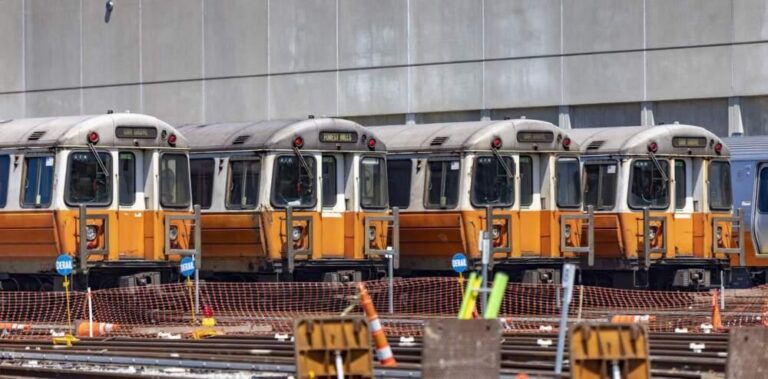The Massachusetts Bay Transportation Authority (MBTA) is confronting notable budgetary pressures as concerns mount over its financial stability and future service reliability.With rising operational costs and funding uncertainties,the agency faces critical challenges that could impact commuter rail,subway,and bus operations across the Greater Boston area. Stakeholders warn that without swift budgetary action, the MBTA’s ability to maintain current service levels and invest in necessary infrastructure upgrades may be at risk, raising alarms among both officials and riders.
Table of Contents
- MBTA Financial Challenges Impact Service and Infrastructure
- Rising Operational Costs and Funding Gaps Raise Alarm
- Community and Stakeholder Responses to Transit Uncertainty
- Strategic Solutions for Long-Term Fiscal Stability and Growth
- Insights and Conclusions
MBTA Financial Challenges Impact Service and Infrastructure
The MBTA is currently grappling with significant budget constraints that are forcing tough decisions across its network.Funding shortfalls have led to delayed maintenance projects and a slowdown in critical infrastructure upgrades, raising alarms about the system’s long-term reliability.Service schedules have been adjusted, with some routes experiencing reduced frequency or temporary suspensions, directly impacting daily commuters who rely on consistent transportation options. These financial hurdles also threaten planned expansions, such as the Blue Line extension to Lynn, which face uncertain timelines amid tightened fiscal oversight.
Key factors contributing to these challenges include:
- Escalating operational costs outpacing fare revenue growth
- Deferred capital investments risking asset deterioration
- External economic pressures limiting state and federal assistance
Stakeholders emphasize the urgent need for innovative funding solutions and enhanced fiscal management to safeguard future service quality. Without strategic intervention, the MBTA’s ability to provide safe, efficient transit might potentially be compromised, affecting regional mobility and economic stability.
Rising Operational Costs and Funding Gaps Raise Alarm
The Massachusetts Bay Transportation Authority is grappling with escalating operational expenses that outpace current budget allocations, signaling a growing threat to the agency’s financial health.Key cost drivers include maintenance demands on aging fleets, such as the extensive overhaul program for F40PH-3C locomotives, which have significantly strained available resources. Compounding concerns are increasing fuel prices, labor costs, and the need for upgraded infrastructure that keep pushing expenditures beyond initial projections.
Funding shortfalls have emerged as a critical risk, with revenue streams failing to keep pace with these surging costs. The MBTA faces a complex challenge in balancing service quality with fiscal duty, as delays in securing adequate state and federal support exacerbate budgetary pressure. Stakeholders warn that without immediate intervention, essential projects and operational efficiency may suffer, potentially impacting commuter experience and regional mobility. Key points of concern include:
- Increased maintenance requirements for legacy equipment
- Rising labor and energy expenditures
- Uncertainty over long-term funding commitments
- Potential scaling back of expansion or betterment initiatives
Community and Stakeholder Responses to Transit Uncertainty
Community leaders and transit advocates have voiced growing concerns as the MBTA grapples with budget constraints that threaten the reliability of vital transportation services. Local businesses emphasize that disruptions could impact commuter flow and economic activity, urging officials to prioritize funding stability. Meanwhile,neighborhood groups highlight the essential role transit plays in connecting underserved populations to employment and education opportunities. The uncertainty surrounding project timelines for upgrades and expansions has fueled anxieties, prompting calls for clear interaction and sustained investment.
Key themes emerging from stakeholder feedback include:
- Demand for clear,timely updates on service changes and capital projects to maintain public trust.
- Concerns over potential fare increases disproportionately affecting low-income riders.
- Calls to safeguard transit equity by ensuring uninterrupted access for all communities despite financial pressures.
- Support for innovative funding solutions, such as public-private partnerships and regional collaboration.
Strategic Solutions for Long-Term Fiscal Stability and Growth
To address the mounting fiscal challenges, the MBTA is exploring a multi-pronged approach focused on sustainable revenue generation and cost containment. Key initiatives include optimizing fare structures,implementing dynamic pricing during peak hours to balance ridership demand,and enhancing partnerships with private entities. Investment in technology upgrades aims to streamline operations,reduce maintenance expenses,and improve overall efficiency. Additionally, the authority is eyeing new grant opportunities and federal funding streams linked to infrastructure improvements and green transit projects.
Efforts to stabilize finances are being bolstered by strategic asset management and service recalibrations targeted at maximizing return on investment.These plans highlight:
- Phased expansion projects aligned with clear ridership and revenue forecasts
- Cost-sharing frameworks with municipalities benefiting from extended services
- Enhanced transparency and accountability measures to build public trust
Collectively, these strategic moves are designed to ensure the MBTA not only overcomes current budget strains but positions itself for resilient growth in a rapidly evolving transit landscape.
Insights and Conclusions
As the MBTA grapples with mounting budget pressures, stakeholders and commuters alike await decisive action to secure the transit system’s financial stability.With ridership patterns evolving and costs rising, the agency faces a critical juncture in balancing fiscal responsibility and service reliability. How the MBTA navigates these challenges in the coming months will be pivotal not only for its operational future but also for the broader region’s economic vitality and mobility.

